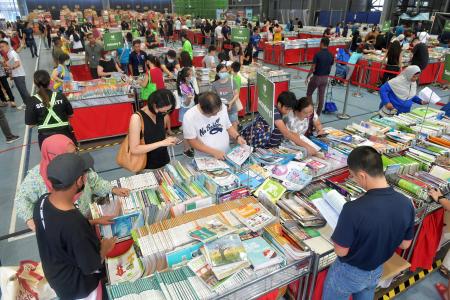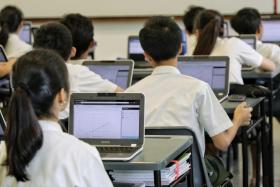School textbooks rise by up to 7% as price freeze ends
Parents of primary and secondary school students have had to pay up to 7 per cent more for textbooks this year with the end of a two-year price freeze on a list of government-approved books.
The prices of textbooks not on this list are also seeing a surge, with some rising up to 21 per cent.
Checks by The Straits Times found that between 2022 and 2023, prices of textbooks like Shing Lee Mathematics 20/20 textbook 1A and 1B went up by about 4.8 per cent.
In response to queries, the Ministry of Education (MOE) said about 20 per cent of the 1,000 primary and secondary school-level textbooks – or around 200 titles – have been allowed to be priced higher, with a cap of 7 per cent. The price increases range from five cents to 65 cents a textbook, it added.
“In recognition of the economic challenges posed by the Covid-19 situation, textbook publishers have absorbed the costs of textbooks over the past two years,” said the ministry.
“But with changes in global economic conditions as well as rising operational and raw material costs due to supply chain disruptions, some publishers have found it necessary to adjust textbook prices.”
MOE added that schools have the flexibility to use books outside the approved textbook list, depending on their assessment of the textbook’s suitability for the learning needs of their students.
In these cases, schools must ensure the textbooks are aligned to syllabus aims and learning outcomes, and that they are affordable and value for money.
Books not on the MOE-approved list include literature books, and some of them have seen bigger price jumps.
For instance, a copy of Boom, a play by Jean Tay used in some secondary schools, spiked in price from $14.90 to $18.10 on one school’s reading list – a 21 per cent increase.
The Principles Of Accounts textbook, published by Marshall Cavendish and used in secondary schools, rose in price by 6 per cent, from $17.15 to $18.20.
Among the biggest jumps was that for a Secondary 2 Express textbook called Distinction In English Text Editing, also published by Marshall Cavendish. Its price surged from $7.70 to $9.65 – a 25 per cent increase.
When asked, Marshall Cavendish and Shing Lee, major publishers of texbooks here, declined to elaborate on the reasons for the price increases.
Parents said they are feeling the pinch.
Ms Toh Ji Rong, 38, an educator whose son is in Primary 5 this year, said: “These textbooks last for the whole year and they are necessary. Fortunately, I work and earn a salary. So the expenses are still manageable.”
Another parent, who asked to be known only as Emil, said she borrowed science and mathematics textbooks for her children from friends to save money.
She said: “I’m a permanent resident and my children pay higher school fees, so if textbooks are more expensive, it will definitely add to my expenses.”
The increase in textbook prices comes amid an overall rise in the cost of living in Singapore.
Ms Hensinely Totong, 45, an administrator at a business centre, paid more than $100 for her Sec 1 son’s textbooks in 2022. She said she received government subsidies to help with the cost of school books and uniforms.
She added: “My pay is not going up at the same rate as the hike in costs for expenses like textbooks.”
Primary and secondary school students on the MOE financial assistance scheme (FAS) will receive free textbooks and uniforms, full subsidies for school and standard miscellaneous fees, as well as transport and meal subsidies to help with their expenses, the ministry said.
From Jan 1, 2023, pre-university students on the MOE FAS will receive a bursary of $1,200 a year that can be used to defray the cost of textbooks.
The ministry said those who do not quality for the MOE FAS but require some financial support may also apply for school-based FAS and/or assistance and bursaries from other schemes administered by their schools, grassroots organisations, or social service agencies.
Get The New Paper on your phone with the free TNP app. Download from the Apple App Store or Google Play Store now


